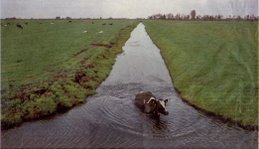The first one is a letter by EU-Commissioner Neelie Kroes, wanting
"to know whether the guarantee to cover €1 billion of the project's cost is equivalent to state aid and if it is, whether it was granted within the rules of EU state aid subsidies."This initiative is of course insufficient and largely beside of the mark: the problem is not state aid, and, if ever the Commission would or could make disappear that guarantee, it would not help against the exclusive dependence of EU-countries on eventual Russian pressures. on the contrary: If the pipeline property and -management becomes a more Russian affair, the dependence and the risk of abuse would only grow.
That is, of course, not Mrs. Kroes' fault. She has no other instruments in her portfolio. Her letter should be seen as a signal to the German Government, that Europe feels uneasy about this gas deal.
Warsaw wants a stake in the gas deal
The second initiative is a Polish one:
Meanwhile, Polish prime minister Kazimierz Marcinkiewicz will travel to Berlin today (9 May) to propose turning the Baltic Sea gas pipeline into an EU-wide scheme with the participation of several EU countries, including Poland.This proposal is tendentially much more in line with the ideas discussed in the previous post here. But it is much more limited and would only (partially) solve the immediate problems arisen around the Schröder deal with Putin. It is a classic nationalist diplomatic initiative, that points not in the way of a common EU guarantee, but in that of traditional inter-government compromises.
"The French, British and the European Commission like our idea at first glance," said Mr Marcinkiewicz's foreign affairs advisor Richard Schnepf, according to the Polish press.
He said the move would give Poland a seat on the board of the pipe consortium, limiting the Kremlin's chances to manipulate Russian gas supply to the EU for political reasons.
Such a compromise would not constitute a sufficient warning to Russia and others who might see their interest in dividing the EU among itself. The reaction of the mostly invisible new German foreign minister Frank-Walter Steinmeier is ominous, in this repect:
" German foreign affairs chief Frank-Walter Steinmeier on Monday said that the planned centre for German WWII exiles in Berlin, the Baltic Sea pipeline and the closure of the German labour markets are the biggest problems for German-Polish relations today."This statement points clearly in the direction of an exclusive German-Polish deal, where Germany would try to trade its interests in other bilateral problems against a possible concession to Poland on the pipeline.
Another reason for the EU, to act now, and quickly, and not to hesitate to go into the heart of the matter!




No comments:
Post a Comment